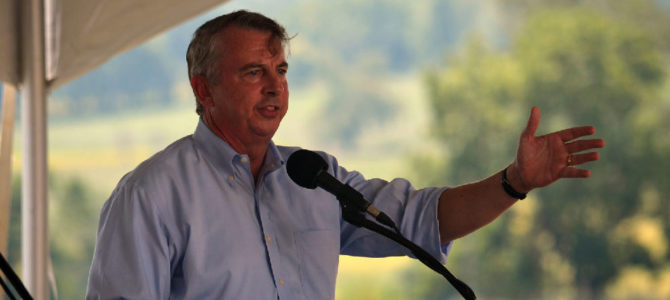
The gubernatorial election in Virginia is less than two weeks away, and of course it’s drawing national attention as a bellwether for the prospects of both major parties in the age of Trump, which to a large extent it is.
The odd thing about the race is that Republican candidate Ed Gillespie and Democratic candidate Lt. Gov. Ralph Northam don’t belong to the rising populist factions of their respective parties. Gillespie, a former Republican National Committee chair, is more or less a centrist Republican who beat a Trumpian candidate in the GOP primary. In the Democratic primary, Northam beat former Rep. Tom Perriello, a progressive who had the endorsements of progressive Democratic standard-bearers Sens. Bernie Sanders and Elizabeth Warren.
So you might think the race wouldn’t be about supposedly “populist issues” like illegal immigration, sanctuary cities, and how many Central American MS-13 gang members live in Fairfax County. But it has been.
Lately, Gillespie has eased off talking about MS-13 and focused more on the economy, but by bringing illegal immigration into the race he’s managed to capitalize on what Trump exposed last year: Democrats, even centrist ones like Northam, don’t really believe in immigration enforcement anymore. To the extent that’s a message even a decidedly non-Trumpian Republican like Gillespie can leverage, it’s not just an immediate problem for Northam but a national problem for the Democratic Party.
Immigration Issue Exposes Democrats’ Fault Lines
Democrats might denounce it as racist, but the importance of the immigration question can’t be emphasized enough. Last week, Andrew Sullivan wrote, “The most powerful thing Trump said in the campaign, I’d argue, was: ‘If you don’t have borders, you don’t have a country.’ And the Democrats had no answer, something that millions of Americans immediately saw. They still formally favor enforcement of immigration laws, but rhetorically, they keep signaling the opposite.”
That immigration would feature so prominently in a race between two relative centrists underscores the extent to which America’s two major political parties are cracking up. This week’s announcement by Sen. Jeff Flake that he won’t seek reelection confirmed that the GOP is increasingly the party of Trump, with all that implies about immigration. On the Democratic side, Northam’s candidacy seems thoroughly out of step with the Sanders wing of his party. Sanders made headlines recently with his unrealistic “Medicare for all” bill, which a growing number of Democratic senators have felt obliged to endorse because it’s really a litmus test of their progressive bona fides. Like health care and abortion, immigration is one of the issues increasingly defining the parties.
It also helps explain why a race that shouldn’t be close is tightening. A new poll this week shows Gillespie ahead of Northam by eight points. The poll is an outlier, but it’s an ominous sign for Democrats. They should be able to hold onto the governorship in Virginia—one of just 16 they hold nationwide. Virginia, after allm voted Democratic in three of the last four gubernatorial elections, the incumbent Democratic governor, Terry McAuliffe, is reasonably popular, and Virginia was the only southern state Hillary Clinton carried last year.
Exposing the Democratic Party line on immigration plays into another dynamic of the race that’s working against Northam: a lack of enthusiasm for him among progressive Democrats who want their party to be done with the Bill Clinton-style centrism he represents. As Josh Kraushaar noted recently in National Journal, Democrats “fear that Northam could pave the way for a moderate revival within the party—that a victory would prove that the party’s candidates can win without being held hostage by the increasingly progressive base.” Why? Because his campaign “has been a rejection of the Democrats’ reliance on identity politics.”
By making immigration an issue, Gillespie is trying to force Northam into a no-win situation. If he tries to defend himself against Gillespie’s charges that he supports sanctuary cities, he’ll anger progressive voters, who do favor sanctuary cities. If he doesn’t, he’ll alienate older, more centrist voters he needs to win.
This Isn’t Just Going to Be a Problem in Virginia
For Northam, there is nothing to do but split the difference, which is why he’s been trying, to some extent, to fire up progressives as election day draws near. George Will reports at National Review Online that Northam “has been saturating liberal Northern Virginia with ads featuring women who are cross because Gillespie is pro-life,” which says a lot about how far left the Democratic Party has shifted: if you’re pro-life you’re a villain.
But that’s the paradox Democrats will face nationally in 2018 and 2020. If they’re honest with voters about their new, progressive consensus on things like immigration and abortion—open borders and taxpayer funding for abortion—how can they win national elections? And if centrist Democratic candidates don’t embrace those extreme positions, much like Hillary Clinton was forced to last year, how can they win primaries?
Maybe Northam will prove this theory wrong by winning in Virginia. Maybe, as progressives fear, he will bring about a moderate revival in his party, or at least slow its left-ward march. But if he can’t manage both to mollify progressive voters and appeal to enough moderates and independents to win next month, it bodes very ill for Democrats nationally, whether they realize it or not.








